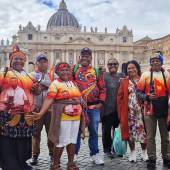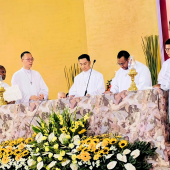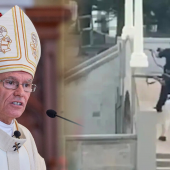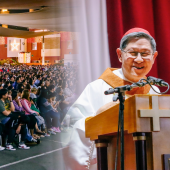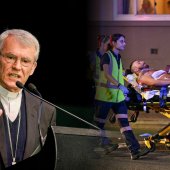The Spirit Descends: 60 Youth Confirmed on Ruprup Island after 15 years in PNG
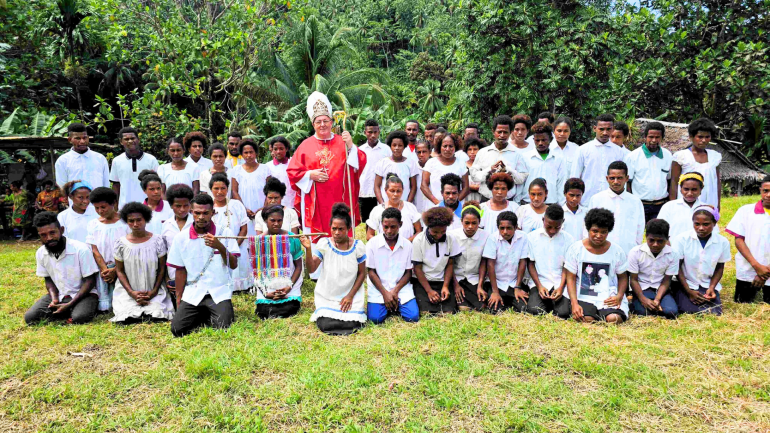
A small volcanic island in Papua New Guinea’s East Sepik Province came alive with song, celebration, and the stirring presence of the Holy Spirit as 60 young people received the Sacrament of Confirmation from Józef Roszyński, the Catholic Bishop of Wewak.
Held on May 27, 2025, on Ruprup Island — a part of the remote Schouten Archipelago — this was the first Confirmation ceremony on the island in over 15 years.
With a population of about 800, Ruprup is a close-knit island community of farmers and fishers. Despite their geographic isolation, the Catholic faith has remained deeply rooted in the hearts of the people since it was first brought to the island by missionaries decades ago.
A Long-Awaited Spiritual Milestone
The preparation for the sacrament began months in advance under the guidance of the island’s catechist team and resident Polish priest, Fr. Darek Wozniak. Youth candidates were taught about the gifts of the Holy Spirit, the significance of Christian maturity, and how to live their faith publicly in a Melanesian context.
On May 24, Roszyński and his team — including two Wewak-based priests and a group of Catholic youth from the mainland — arrived on a diocesan boat. They were greeted by villagers in canoes, conch shell blasts, and women singing traditional Murik songs blended with the Marian hymn “Maria Mama Bilong Mi.”
“I come not just as your bishop,” Bishop Roszyński told the crowd, “but as your brother in Christ. The Holy Spirit is alive here, and today we will celebrate this truth together.”
A Sacred Celebration by the Sea
The Confirmation Mass was held beneath a large canvas tent next to the small island chapel, St. Peter the Fisherman. Villagers had spent days preparing the venue with bamboo shading, fresh flowers, and handmade decorations. Confirmands wore white shirts or meri blouses, paired with red laplaps, and held candles representing the light of Christ.
During the homily, delivered in Tok Pisin, the bishop reminded the community that the Holy Spirit often comes to the least expected places — not just cathedrals or cities, but even tiny islands like Ruprup. “The Holy Spirit makes us strong, wise, and full of love. It makes us missionaries — even in our own homes and villages,” he said.
As the bishop anointed each candidate’s forehead with chrism oil and spoke the sacred words, “Receive the gift of the Holy Spirit,” the islanders fell into a reverent silence, interrupted only by the wind and soft Kundu drums.
Sixteen-year-old Danyel Ita, one of the Confirmands, shared his experience: “I walked across the island every week for catechism. Today I feel ready to teach others and help lead my people in faith.”
Faith Celebrated in Culture
The ceremony was followed by a joyful island feast, or mumu, with roasted pork, fish, taro, sweet potatoes, and sago pudding cooked on hot stones and served with coconut milk. Youth and elders alike performed traditional dances and Gospel-themed skits in celebration of the Spirit’s arrival.
Bishop Roszyński gifted the island a chalice and paten from Wewak Cathedral, signifying an enduring bond with the diocese. “You are no longer just receivers of the Word,” he said in his final blessing. “You are now proclaimers. Let your words and lives reflect the light of Christ.”
The Spirit Remains
As the bishop’s boat departed the next morning, villagers returned to the chapel for rosary and evening songs, determined to keep the flame of faith alive. Elder Peter, 73, baptized by Divine Word Missionaries in the 1950s, reflected on the event: “We waited many years for this. Now our youth are confirmed. The Church is alive again.”
The Sacrament of Confirmation on Ruprup was more than a ceremony — it was a spiritual homecoming, a cultural renewal, and a sign that the Spirit of God truly reached every shore.
Radio Veritas Asia (RVA), a media platform of the Catholic Church, aims to share Christ. RVA started in 1969 as a continental Catholic radio station to serve Asian countries in their respective local language, thus earning the tag “the Voice of Asian Christianity.” Responding to the emerging context, RVA embraced media platforms to connect with the global Asian audience via its 21 language websites and various social media platforms.









